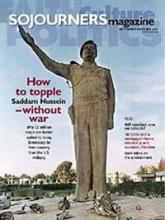Father John McNamee is a priest in the Philadelphia 'hood with a tough job. The boiler at St. Malachy's Catholic Church is broken, there's not enough food to feed the poor each evening, and there's no money to bail out the neighborhood kid who was again picked up for drugs. What makes Father Mac's vocation harder is that his inner life is just as desolate.
Diary of a City Priest, a film based on Father McNamee's book by the same name, covers a year in Father Mac's life, in which he tries to meet the spiritual and physical demands of his flock with an ever-diminishing belief that he's making any difference. In voice-overs throughout the film, Father Mac reads from the journal he's been keeping to capture fragments of his shattered self. He also uses the words of people such as Dorothy Day, Simone Weil, Thomas Merton, and Daniel Berrigan for inspiration and solace against his loneliness.
His feelings of isolation, a hazard of the job, are acute. Father Mac attends a party given by a couple, presumably St. Malachy's parishioners, who—with all pretentious humility—announce they'd like to donate their four-year-old car to the church: "It's too old for us," the husband says to Father Mac, "but not for you." He accepts their gift, first wondering to himself how long it will last in his neighborhood, then musing: "We all have ideas about what life is like in the inner city. I guess this is their attempt to brighten my day."
Father Mac's grip on faith and his vocation are fragile, but it's a hold that keeps him close and humble. Diary of a City Priest is a quiet film about a quiet man trying to lead a good and useful life. With the ever-present reminders of clergy abuse and the church's misuse of power, it's important to remember those who go about the simple but profound service of being present.
Read the Full Article
